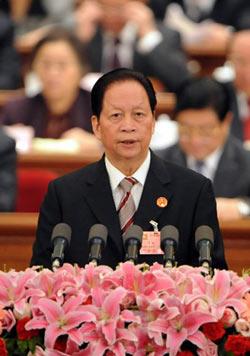China
Key points of Chief Justice report
WATCH VIDEO
Source: CCTV.com | 03-10-2008 13:35
Special Report: 2008 NPC & CPPCC sessionsThe Chief Justice of China's Supreme People's Court says efforts over the past five years by the country's courts to crack down on various criminal activities have helped to safeguard national security and social stability. He also says efforts are being stepped up to promote the protection of human rights.
 |
| The President of the Supreme People's Court Xiao Yang delivers a work report of the Supreme People's Court during the third plenary meeting of the First Session of the 11th National People's Congress (NPC) at the Great Hall of the People in Beijing, March 10, 2008.(Xinhua/Li Xueren) |
Chief Justice, Xiao Yang, reviewed the main efforts made during the past 5 years.
From 2003 to 2007, China's Supreme People's Court handled a total of 20,451 cases. That's up 0.78 percent over the previous five years.
In the past 5 years, the Supreme Court tried over 4,800 criminal cases. It also supervised local courts which heard and concluded nearly 3.4 million criminal cases. That's an increase of over 19 percent over the past 5 years. Meanwhile, 760,000 people received sentences from five years and above to life imprisonment, or the death penalty.
The Court also supervised and supported administrative organizations to ensure they acted according to law. The court's work aims to protect the rights and interests of all citizens and litigants. And to promote economic development and social harmony.
The Supreme Court also improved its review mechanism, making more efforts to resolve complaints.
It also improved its spokesperson mechanism to ensure people can get timely information. The Court also actively promoted public awareness of the law.
During the past five years, the Supreme Court strictly followed the principle of promoting justice for civilians. Its aim has been to safeguard social justice and equality.
Courts at all levels strengthened the judiciary on administrative disputes. Especially in cases involving land conscription, city construction, social security and farmers' rights.
During the period, the Supreme Court has also improved the trial system, with socialist Chinese characteristics.
Xiao says in the past five years, the Supreme Court has attached great importance to the construction of the judges team. It has also made considerable progress in promoting the capability of the administration of justice. Some 230 thousand judges participated in training courses. And improvements have been made in the system for selecting and managing judges.
The Supreme Court received and replied to over 700 suggestions from NPC deputies and over 240 proposals from CPPCC members.
In the coming year, the Supreme Court is pledging to continue implementing the spirit of the the 17th CPC National Congress. And also to continue supervising and guiding courts at different levels to promote social justice.
It will also resolve cases that have been judged unfairly. The Supreme Court is planning to improve mechanisms making it more convenient to file lawsuits in these situations and fully exert the Supreme Court's supervising function.
The Supreme Court is also pledging to push forward reforms and improve the assignment of different positions and rights within the court.
It says it will further strengthen judicial infrastructure and promote the judiciary's capability. This includes improving the judging mechanism. And also strengthening financial support to the courts in central and western areas, and other poverty-stricken regions.
The Supreme Court will also continue theoretical training and work to arrange the proper movement of judges from different levels of the courts.
Editor:Zhang Ning



